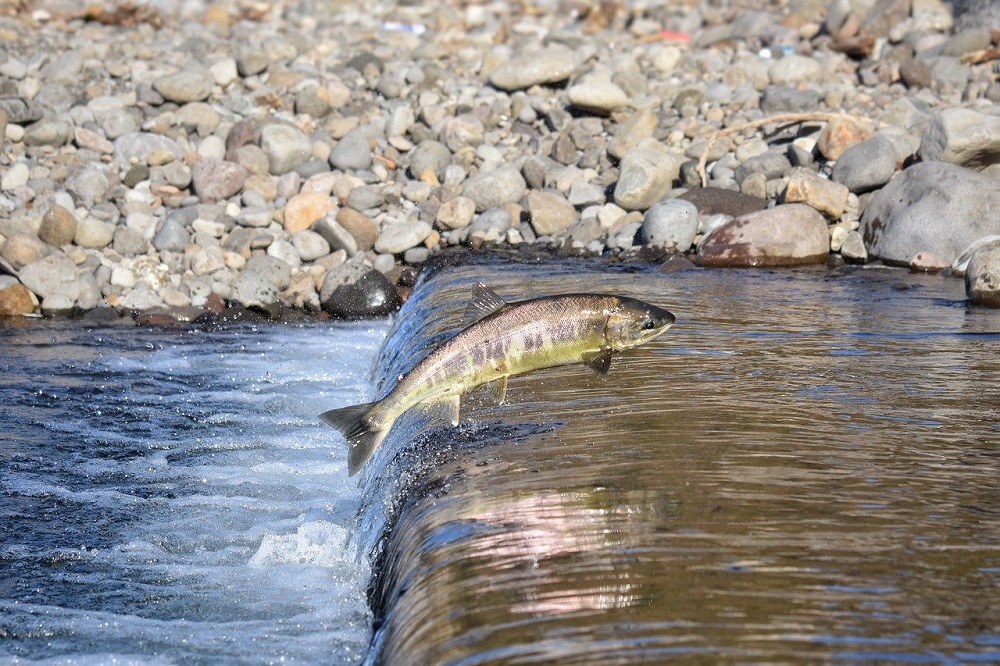Salmon and sea trout numbers continue to decline in Wales despite conservation efforts

The latest data published by National Resources Wales (NRW) has confirmed a further decline in the number of salmon and sewin found in Welsh rivers.
NRW’s latest salmon stock assessments reveals that last year Wales recorded the lowest catches of both salmon (252 nets, 848 rods) and sea trout (610 nets, 5,669 rods) since consistent records began in 1970s.
This represents a 4% decline from the previous year, but more worrying highlights an approximately 70% decline over the past ten years.
All 23 Principal salmon rivers in Wales are now categorised as being “At Risk”.
Environmental quality
Ben Wilson, principal fisheries advisor for NRW, said: “Salmon, and their close cousins sea trout (sewin) are iconic and highly prized species in Wales. Their need for cool, clean and healthy freshwater and marine habitats makes them key indicators of environmental quality of our waters, as well highlighting the impact that climate change is having on the aquatic environment.”
“Last year Atlantic salmon were reclassified by the International Union for Conservation of Nature from ‘Least Concern’ to ‘Endangered’ in Great Britain as a result of a 30-50% decline in British populations since 2006.”
Concerted efforts
The decline has continued despite concerted efforts to protect habitats and conservation efforts made by both rod and net fishers. Conservation byelaws passed in 2020 require all net and rod caught salmon to be returned unharmed.
As a result, salmon returning to Welsh rivers have contributed an estimated 8 million eggs over four years and returned fish contributed about 6% of the total estimated egg deposition in Wales in 2023, providing invaluable support in arresting the decline of wild populations.
Sea trout stocks, which were previously considered more robust, are also showing significant levels of decline.
Wales has 33 main sea trout rivers, 30 (91%) were classed as “At Risk” while only three (9%) of these are deemed to be as “Probably at Risk”, No rivers in Wales are deemed to be “Not at Risk”.
All Welsh stocks are now in serious trouble and at risk of failing to maintain sustainable populations in the future.
Extremely worrying
Mr Wilson added: “These latest figures are extremely worrying and indicate that many stocks are now in serious trouble and are at risk of failing to maintain sustainable populations in the future.
“Of all the pressures faced by Atlantic salmon and sea trout, climate change impacts in freshwater and at sea appear to be having a devastating effect on stocks, as both our seas and rivers warm up.
“While this is a clear indication that society needs to redouble its efforts to address climate change, our best hope for salmon and sea trout is to tackle the many other factors that we can control.
“We must provide them with cool, clean water in our rivers and continue to address issues like water quality, dams and barriers, exploitation, and invasive non-native species.
“These declines are replicated in most other countries across the North Atlantic distribution of salmon and their European range, where populations have declined over the past few decades.”
Support our Nation today
For the price of a cup of coffee a month you can help us create an independent, not-for-profit, national news service for the people of Wales, by the people of Wales.






Sad state of our once mighty, once beautiful rivers.
Blame Climate Change. Blame Farmers. Blame Water companies.
We need to fix this!!
There is no evidence to suggest that it is the water quality in our rivers that has caused this decline as both salmon and sewin are site specific migrants. Decline occurs in all rivers, regardless of improvement or decline in water quality. Also, permeant residents like rainbow and brown trout do not suffer such a decline, so the problem rests elsewhere. Probably with sea based disease concentrated by fish farming, a known vector in Scotland and Ireland, or predation, fishing or natural, whilst out at sea.
If the water companies are allowed to keep getting away with out flows and STILL allowed to give shareholders dividends it will continue! Freeze paying dividends until they are complying with their STATUTORY duties. And if they do not, Nationalise the lot!!
It starts with the river if there is no minnows in the river for the young salmon to feed on before thay are strong enough to go to sea then it will decline then a lot of them come back to the river and dont make it to the spawning ground because of human obstruction ther needs to be a breeding program for minnows for or rivers before we even start
Thatcher was known as “Milk Snatcher”. Her water privatisation adds “Fish Killer “ to her list of epithets.